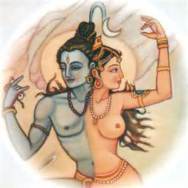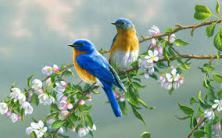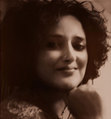Mira Prabhu's Blog, page 62
September 16, 2015
What Is Being An Indie Author All About
The good old days of being taken care of as an author (by a publishing house, agent, etc) have more or less gone with the wind for most modern writers. Getting our creative work out into the world is a complex and daunting task today; it takes an enormous amount of zeal, intelligence and energy. Read all about it here – and thank you, Michelle Rene Goodhew, for a great post!
 Originally posted on The IndieAuthor Advocate: Articles, Book Cover Design, Illustration & More by Michelle Rene:
Originally posted on The IndieAuthor Advocate: Articles, Book Cover Design, Illustration & More by Michelle Rene:
By Michelle Rene Goodhew
If you are an independent author or a writer on your way to becoming published, this articles for you.
Sitting on your laurels and basking in the glow of being published is not necessarily success.
Success is also about amassing a fan base of the work you have written, of receiving the payment that comes from your words being appreciated by a large assortment of the public.
Your book deserves the kind of time and attention that creating a best-seller requires.
I’m not saying that getting to the point of publishing does not deserve a feeling of success, but it may be only a point on the road to success, not a stopping point.
Becoming a successful author is more about a structured system of actions, business savvy, marketing strategy, and your ability to maintain a healthy and positive attitude. You are responsible for discovering just how good…
View original 1,126 more words


September 9, 2015
5 TED Talks That Will Change the Way You Think, Read, Write, and See the World
“TED Talks are among the most watched videos on the Internet. Born from a 1984 conference on technology, entertainment and design (hence the acronym TED) they have grown into a multi-national phenomenon, with celebrities and the relatively unknown giving filmed speeches and presentations on topics as wide-ranging as ethics, music, art, books, marketing, history, and psychology. The one thread that connects the over 2,000 talks is that they are personal. The non-profit TED now runs talks, seminars, retreats and fellowships across the world with one mission: to facilitate the spread of ideas.
Below are five top TED talks on writing, creativity, social media, and books. These are not dry university lectures – they are among the most thought-provoking and engaging videos we’ve ever seen.”
 Originally posted on readers+writers journal:
Originally posted on readers+writers journal:
 Eye-Opening & Mind Expanding: The Top TED TalksonCreativity
Eye-Opening & Mind Expanding: The Top TED TalksonCreativityTED Talks?
TED Talks are among the most watched videos on the Internet. Born from a 1984 conference on technology, entertainment and design (hence the acronym TED) they have grown into a multi-national phenomenon, with celebrities and the relatively unknown giving filmed speeches and presentations on topics as wide-ranging as ethics, music, art, books, marketing, history, and psychology. The one thread that connects the over 2,000 talks is that they are personal. The non-profit TED now runs talks, seminars, retreats and fellowships across the world with one mission: to facilitate the spread of ideas.
Below are five top TED talks onwriting, creativity, social media, and books. These are not dry university lectures – they are among the most thought-provoking and engaging videos we’ve ever seen.
Mind-Expanding TED Talk
1. Andrew Fitzgerald – Adventures in Twitter Fiction
Length: Under 12Minutes
Fitzgerald is a…
View original 441 more words


September 8, 2015
How to write sound – putting an accent on the page
“How to write sound – putting an accent on the page”.
Thank you, Bridget Whelan!
 Originally posted on BRIDGET WHELAN writer:
Originally posted on BRIDGET WHELAN writer:
 The way we use language differs depending on whether we are speaking it or writing it and that difference has to come across on the page. But what about how it sounds?
The way we use language differs depending on whether we are speaking it or writing it and that difference has to come across on the page. But what about how it sounds?There is a tendency to think that only other people have accents while we just speak normally.
The truth is we all speak in a way that reflects where we come from and our experiences, but only some character are subject to the indignities of dropped letters and other visual tricks.
Here’s an example of it done very, very badly. So badly it makes you want to wince.
“Ello, Miss,” he said, politely touching his forehead with a finger in a kind of salute. “It’s a right ‘onor. ‘Course, my old mum an’ I, we seen all yer pictures. She’s a great fan ‘o yers, is me mum.”
It can be done well. Here’s a short snatch of…
View original 445 more words


September 7, 2015
MONDAY FUNNIES with MAXINE…
ha ha ha…Maxine strikes again… “The economy is so bad that if they return your check marked “Insufficient Funds”, you call and ask if they meant you or them.” Thanks for the laughs, Chris Graham!
 Originally posted on Chris The Story Reading Ape's Blog:
Originally posted on Chris The Story Reading Ape's Blog:









September 6, 2015
The Sunday Show – Chris, The Story Reading Ape – Payback time.
Both Sally Cronin and Chris Graham (the Story-Reading Ape Himself!) are wonderful writers who open their hearts and share their resources with the Indie author…this despite their own hectic schedules. Now don’t miss Sally interviewing Chris….
 Originally posted on Smorgasbord - Variety is the spice of life:
Originally posted on Smorgasbord - Variety is the spice of life:
Chris the Story Reading Ape is a friend to Indie Authors across all genres and abilities. Apart from opening up his blog up to writers to promote themselves and their books, he also provides some excellent posts in the form of tutorials that are very valuable for both experienced and novice writers.
When I broached the subject of an interview I was delighted when Chris very kindly said he would be happy to guest on the Sunday show. This presents quite a challenge as The Story Reading Ape is an enigma to say the least and you will find very little information as to his background online so I was excited about the prospect of finding out a little more. And, I am also pleased to be able to repay some of the hospitality that Chris has shown to writers like me who welcome any chance to showcase our own…
View original 1,488 more words


Analogies and Metaphors
“Dying is a wild night and a new road,” said Emily Dickinson.
And I say WOW…for a good analogy/metaphor is a powerful device to hook a reader’s imagination. Read on if you love the magic skilfully used words can produce….and thank you for this excellent piece, Aurora Jean Alexander!
 Originally posted on Writer's Treasure Chest:
Originally posted on Writer's Treasure Chest:
When I read a book I enjoy analogies and metaphors, provided the author hasn’t gone overboard with them. Knowing I still got to learn I pay close attention to what I like to read. In my opinion, a story, a book, even an adventure can be written in vivid and imaginative way when containing metaphors and/or analogies.
Lately I realized that an analogy and a metaphor can be similar. So I got research done.
What are analogies and metaphors? Are there good analogies and metaphors and which are the ones that should be avoided?
Let’s see what I found out:
Definition
Analogy (from Greek ἀναλογία, analogia, “proportion”[1][2]) is a cognitive process of transferring information or meaning from a particular subject (the analogue or source) to another (the target), or a linguistic expression corresponding to such a process. In a narrower sense, analogy is an inference or…
View original 1,477 more words


September 5, 2015
6 Reasons Why We Write
6 Reasons Why We Write…thank you Georgina Cromarty and Chris Graham!
Why do I write? Perhaps because writing dissolves time… and the powerful emotions aroused by both mundane and sublime events are productively channeled…because I have so much to say and no one who can listen endlessly…because as a maverick muse, I have experiences others who have lived the conventional life may want to hear about and resonate with….and for so many other reasons…
Why do YOU write?
 Originally posted on The Writing Chimp:
Originally posted on The Writing Chimp:
I want to spill ink onto pages that will break your heart, then mop up the careless mess into words that might fix you.
When we write, we do so for a myriad of reasons that can shift depending on our mood, our environment, events that have happened, or even our time in life.
Sometimes, it is just a bone deep desire that we can neither quantify nor explain. Sometimes we write for a broad spectrum of needs, and sometime for only one.
So, why do we write?
To express how we feel.
Writing at its most fundamental level, is a expression of our inner-most feelings. It doesn’t matter whether you are writing an extreme horror, or a children’s book. We pour our feelings out onto the pages, and may put ourselves into the mind of a psychopath, a soldier, an abandoned child, or a miss-understood teenager. We use our imagination, or…
View original 324 more words


September 4, 2015
12 Days in Africa by Lisa Sanders
12 Days in Africa: A Mother’s Journey…utterly moving…and just what I needed to drive me out of the blues by considering my myriad blessings.
Here’s an excerpt: “During their walk to the water source, it is a common occurrence for the children to be accosted, beaten and raped by men who have no other purpose in their lives but to lie in wait and hurt the innocent. At their school, the children are required to bring a container full of water. If they don’t, they are caned. An eight-year-old from this village was raped on the way to get her water for school. The men stole her water container as well. She still managed to make it to school, but without her water. The teacher showed her no mercy; instead she was caned for showing up without her water.”
Yes, this is the way it is for some of us humans.
12 Days in Africa: A Mother’s Journey is available from Amazon. All profits from this book will be donated to build lifesaving wells in villages desperate for clean water. so, if you can, buy it and spread the word. Thank you Jo Robinson and Lisa Sanders.
 Originally posted on Ms M's Bookshelf:
Originally posted on Ms M's Bookshelf:
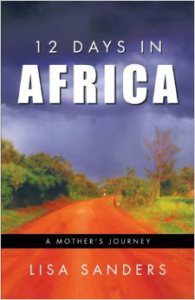 I received a free ecopy of this book from Book Look Bloggers in exchange for an honest review.
I received a free ecopy of this book from Book Look Bloggers in exchange for an honest review.
Anticipating the “empty nest syndrome” with son, Trent, away at university and son, Blake, heading off the following year, Lisa Sanders begins praying about what she might do by way of serving God and making a difference. One might say that venturing to Alaska with her husband, Greg, and staying for 26 years had been quite an adventure in itself, but that has nothing to compare with the exciting and unusual experiences God had in store for her as he led her to join Hope4Kids International on a 12-day mission to Uganda, taking her teenaged son, Blake, with her. This book is a compilation of her “recollections and reflections” and those of some of her travel mates, of what happened after she walked through God’s open door and entered Africa.
With both…
View original 1,084 more words


September 3, 2015
Two Great Truths of Absolute and Relative Reality
In my volatile teens, I was struck by the poignant beauty of an ancient metaphor (contained within the Mundaka Upanishad) that speaks of two birds perched on the branch of a tree: one bird eats the fruit of the tree while the other watches.
The first bird represents the individual self/soul; distracted by the fruits (signifying sensual pleasures), she forgets her lord and lover and tries to enjoy the fruit independent of him. (This separating amnesia is known in Sanskrit as maha-maya or enthrallment; it results in the plunge of the individual into the ephemeral realm of birth and death.) As for the second bird, it is an aspect of the Divine/Self that rests in every heart—and which remains forever constant even as the individual soul is bedazzled by the material world.
This teaching implies that it is ignorance of our true nature that creates a vicious cycle: the individual, being blinded by the illusion of existing as a separate entity, has no option but to act—and therefore fresh misery is piled on the old. But the Absolute is whole and free of illusion; performing no actions it is not bound by karma.
In the grip of maya/illusion, the individual is subject to confused behavior (the classical definition of “karma” or “doing” is the movement of the mind and what it produces in terms of speech and action). Unable to put a halt to its own wretched trajectory, the individual soul passes through several kinds of wombs in accordance with its actions—but when it finally recognizes the other bird (the Divine) as its eternal Self, the veil of delusion is removed and bliss takes the place of sorrow.
Scholarly interpretations of this verse abound and you can investigate them quite easily. For me, however,it provided a golden key to understanding the link between Infinite Being and the finite self, helping me “see” both my inner world and my surroundings with fresh eyes.
 My own journey accelerated when, as a mutinous teen, I picked up a book from my father’s revolving rosewood bookcase—a green paperback with a yogi sitting motionless beneath a tree on the cover. Something both splendid and terrible arose within me at the sight of him, and I knew this would be the path I would choose to make sense of what then appeared to be a cruel and senseless world.
My own journey accelerated when, as a mutinous teen, I picked up a book from my father’s revolving rosewood bookcase—a green paperback with a yogi sitting motionless beneath a tree on the cover. Something both splendid and terrible arose within me at the sight of him, and I knew this would be the path I would choose to make sense of what then appeared to be a cruel and senseless world.
As the years flew past, I teetered between agnosticism and atheism, railing against a supposedly benevolent Creator God who could create a world rife with seemingly meaningless pain and confusion.
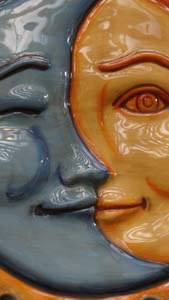 Then, during my later years of study with the Mahayana Buddhists, I encountered The Two Truths: a metaphysical metaphor concerning the soul that first appears in Vedic scriptures (Rig Veda, Mundaka and Svetasvatara Upanisads). It was this powerful teaching that brought back to me the Upanishadic tale of the two birds: one representing the Relative, the other the Absolute.
Then, during my later years of study with the Mahayana Buddhists, I encountered The Two Truths: a metaphysical metaphor concerning the soul that first appears in Vedic scriptures (Rig Veda, Mundaka and Svetasvatara Upanisads). It was this powerful teaching that brought back to me the Upanishadic tale of the two birds: one representing the Relative, the other the Absolute.
Thanks to excellent gurus, I did not fall into the trap of using the Two Truths to create a true-false dichotomy, whereby the Absolute is true reality and the Reality is false reality; both Absolute and Relative Reality are truths. Secondly, Absolute and Relative are often described as different levels of reality—but the two are intertwined; seen through realized eyes, the two are an undivided whole.
The path up the mountain of pure consciousness can be a treacherous one and those who do not meticulously prepare for this most magnificent hike of all are liable to get lost. Each of us must discover for ourselves what needs to be done in order to realize the Self; since the goal is to know oneself as pure blissful consciousness, permanently free of desire and fear, blazing with light, the true seeker does whatever is necessary to scale this crystal mountain.
The quest deepens when we teach ourselves to distinguish between Real and Unreal (Absolute and Relative). The Real, according to Advaita, is that which does not come and go—and the only thing that fits this definition is our primal consciousness, and what precedes it: the Absolute Unmanifest.
 Today I am committed to the path to freedom that Ramana Maharshi revealed: Atma-Vichara/Self-Investigation/the Direct Path. Atma-Vichara is simple but not easy and the way I approach it hinges on the critical distinction made clear to me by both the Upanishadic metaphor as well as the Two Truths. As I walk this jewel-strewn way, I am grateful to those who cared enough to share their amazing insights with us.
Today I am committed to the path to freedom that Ramana Maharshi revealed: Atma-Vichara/Self-Investigation/the Direct Path. Atma-Vichara is simple but not easy and the way I approach it hinges on the critical distinction made clear to me by both the Upanishadic metaphor as well as the Two Truths. As I walk this jewel-strewn way, I am grateful to those who cared enough to share their amazing insights with us.
Greetings from Arunachala, the sacred mountain known to be the great God Shiva himself, and who helps the committed seeker destroy the Unreal so we can experience our Self as immortal bliss!
Follow Blog via Email
Enter your email address to follow this blog and receive notifications of new posts by email.
Click the buttons below to SHARE if you liked this post.


15 Words You Never Knew Came From Literature
Ha! Who knew the word “freelance” derives from mercenaries who sold their swords for money? Not me, although I worked freelance for years in Manhattan. Read on for more such gems….and thank you Chris Graham and International Book Promotion.com for the education.
 Originally posted on International Book Promotion:
Originally posted on International Book Promotion:
 15 Words You Never Knew Came From Literature
15 Words You Never Knew Came From Literature
Did you know that these words came from the literature earlier? Share your scores here!




